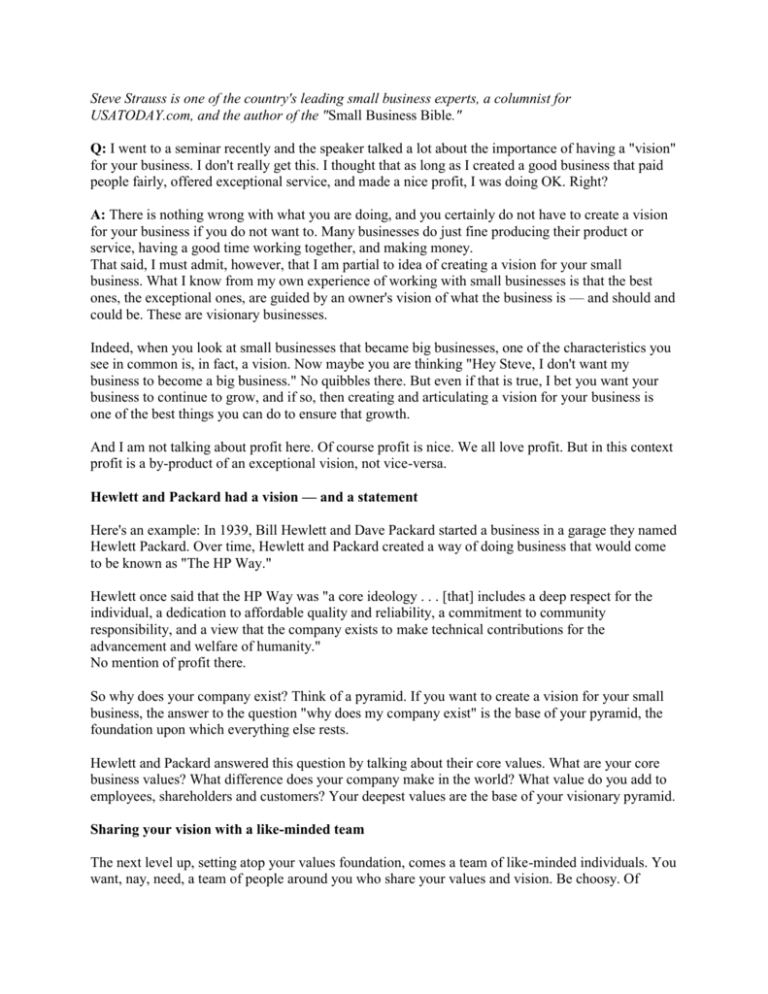Small Business Bible, article by Steve Strauss
advertisement

Steve Strauss is one of the country's leading small business experts, a columnist for USATODAY.com, and the author of the "Small Business Bible." Q: I went to a seminar recently and the speaker talked a lot about the importance of having a "vision" for your business. I don't really get this. I thought that as long as I created a good business that paid people fairly, offered exceptional service, and made a nice profit, I was doing OK. Right? A: There is nothing wrong with what you are doing, and you certainly do not have to create a vision for your business if you do not want to. Many businesses do just fine producing their product or service, having a good time working together, and making money. That said, I must admit, however, that I am partial to idea of creating a vision for your small business. What I know from my own experience of working with small businesses is that the best ones, the exceptional ones, are guided by an owner's vision of what the business is — and should and could be. These are visionary businesses. Indeed, when you look at small businesses that became big businesses, one of the characteristics you see in common is, in fact, a vision. Now maybe you are thinking "Hey Steve, I don't want my business to become a big business." No quibbles there. But even if that is true, I bet you want your business to continue to grow, and if so, then creating and articulating a vision for your business is one of the best things you can do to ensure that growth. And I am not talking about profit here. Of course profit is nice. We all love profit. But in this context profit is a by-product of an exceptional vision, not vice-versa. Hewlett and Packard had a vision — and a statement Here's an example: In 1939, Bill Hewlett and Dave Packard started a business in a garage they named Hewlett Packard. Over time, Hewlett and Packard created a way of doing business that would come to be known as "The HP Way." Hewlett once said that the HP Way was "a core ideology . . . [that] includes a deep respect for the individual, a dedication to affordable quality and reliability, a commitment to community responsibility, and a view that the company exists to make technical contributions for the advancement and welfare of humanity." No mention of profit there. So why does your company exist? Think of a pyramid. If you want to create a vision for your small business, the answer to the question "why does my company exist" is the base of your pyramid, the foundation upon which everything else rests. Hewlett and Packard answered this question by talking about their core values. What are your core business values? What difference does your company make in the world? What value do you add to employees, shareholders and customers? Your deepest values are the base of your visionary pyramid. Sharing your vision with a like-minded team The next level up, setting atop your values foundation, comes a team of like-minded individuals. You want, nay, need, a team of people around you who share your values and vision. Be choosy. Of course when creating a management team you need to look at experience, business skills, contacts and dedication. All I am saying is "commitment to your vision" should be added to that skill set. Next on our metaphorical pyramid comes commitment, a commitment to your vision. Business is not easy. Is it fun, exciting and challenging? Of course. But easy it is not. This is especially true if you want to create a visionary business, a business that can make a difference. There may come a time when you will be tempted to cut corners and bend the vision in order to make a deal. What stops you? Your commitment to your vision is bigger than your desire for a quick profit. The virtues of vision and commitment When it comes to commitment, don't just take my word for it, consider one of my favorite quotes ever by William H. Murray from his book, The Scottish Himalayan Expedition: Until one is committed, there is hesitancy, the chance to draw back, always ineffectiveness . . . [But] the moment one definitely commits oneself, then Providence moves too. All sorts of things occur to help one that would never otherwise have occurred. A whole stream of events issues from the decision, raising in one's favor all manner of unforeseen incidents and meetings and material assistance, which no man could have dreamed would have come his way. I have also learned a deep respect for one of Goethe's couplets: "Whatever you can do or dream, you can begin it. Boldness has genius, power, and magic in it." Of course, the top of your vision pyramid is action. It is all worthless — creating and articulating a vision for your business and forming a team of similarly committed individuals — unless you are all willing to act on your vision. The best of the best small businesses, indeed all businesses, are visionary businesses. So go ahead and create a vision for your business. It should focus your energies and inspire everyone around you. And you never know where it may lead you, for boldness has genius, power and magic in it.











